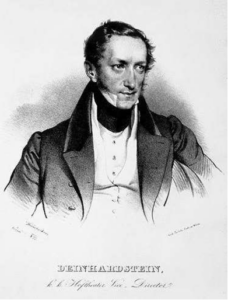Drinking song
(Poet's title: Skolie)
Set by Schubert:
D 306
[October 15, 1815]
Part of Selam (putative cycle)
Lasst im Morgenstrahl des Mai’n
Uns der Blume Leben freun,
Eh’ ihr Duft entweichet!
Hauch er in den Busen Qual,
Glüht ein Dämon im Pokal,
Der sie leicht verscheuchet.
Schnell, wie uns die Freude küsst,
Winkt der Tod, und sie zerfließt;
Dürfen wir ihn scheuen?
Von den Mädchenlippen winkt
Lebensatem, wer ihn trinkt,
Lächelt seinem Dräuen.
In the morning beams of May let
Us enjoy the flower of life
Before its scent fades!
If it breathes anxiety into the breast
There is nevertheless a demon glowing in the beaker
That can easily scare it off.
As quickly as joy kisses us
Death beckons us and it flies away;
Should we be afraid of death?
Beckoning from the lips of girls is
The breath of life; anyone who drinks this
Can laugh at death’s threats.
All translations into English that appear on this website, unless otherwise stated, are by Malcolm Wren. You are free to use them on condition that you acknowledge Malcolm Wren as the translator and schubertsong.uk as the source. Unless otherwise stated, the comments and essays that appear after the texts and translations are by Malcolm Wren and are © Copyright.
☙
Themes and images in this text:
Breath and breathing Chest / breast Cups and goblets Drinking songs Fading and losing colour Flowers Joy Kissing Laughing Lips May Morning and morning songs Rays of light Smells
This poem, which does not appear in Deinhardstein’s collected work, was published in ‘Selam. Ein Almanach für Freunde des Mannigfaltigen‘ in 1814, the same volume where Schubert had found Kump’s ‘Mein Gruß an den Mai’, which he set to music on the same October day. Kumpf’s May greeting encouraged dancing; Deinhardstein’s is a ‘Skolion‘. According to The New Princeton Encyclopedia of Poetry and Poetics (ed. Preminger and Brogan, 1993), “[t]he etymology of the term is uncertain but perhaps derives from Greek skolios ‘crooked’: the guests at a symposium would sing in sequence, each holding a myrtle branch then passing it to another at random – ‘crookedly’.”
In some poems about spring, the flowers seem to herald a broader improvement in the world and in the speaker’s individual prospects, but that is not the case here. The blossoming that is celebrated in this paeon to the month of May is not a promise of anything better to come. Flowers are fragile and this moment is when they are at their best. This is the same attitude that underlies cherry blossom viewing in Japan. It is because the blossom does not last that it functions as a metaphor for humans; what we have to contemplate is the briefness of the moment and the imminence of decay. Just as in Japan (though Deinhardstein, writing in provincial Austria during the wars of liberation could not have known about the parallel), the drinking of alcohol encourages suitable thoughts about enjoying the moment and preparing yourself for death.
The second stanza completes the usual Germanic triptych: ‘Wein, Weib und Gesang’ (wine, woman and song). The raucous drinkers (mostly or exclusively male) take it in turns to drink and sing, but there has to be a reference to sex as part of the ritual. They are now reminded that as soon as they are ‘kissed by joy’ they feel death calling them. This was all too literally true, of course, given the virulence of sexually transmitted disease in their world. Nevertheless, the lure of ‘girls’ lips’ (not a particularly subtle double entendre) is so great that they laugh at the threat. The company and the alcohol would have helped in this (they probably did not do much laughing the next morning when they woke up with a hangover along with the first signs of the fearful symptoms).
☙
Original Spelling Skolie Laßt im Morgenstrahl des May'n Uns der Blume Leben freun, Eh' ihr Duft entweichet! Hauch er in den Busen Qual, Glüht ein Dämon im Pokal, Der sie leicht verscheuchet. Schnell, wie uns die Freude küßt, Winkt der Tod - und sie zerfließt; Dürfen wir ihn scheuen? Von den Mädchenlippen winkt Lebens-Athem, wer ihn trinkt, Lächelt seinem Dräuen.
Confirmed by Peter Rastl with Schubert’s source, Selam. Ein Almanach für Freunde des Mannigfaltigen. Herausgegeben von I.F.Castelli. Dritter Jahrgang 1814. Wien, gedruckt und im Verlage bey Anton Strauß, page 208.
To see an early edition of the text, go to page 208 [252 von 384] here: http://digital.onb.ac.at/OnbViewer/viewer.faces?doc=ABO_%2BZ255496805


